冷战结束后的美苏关系和布什政府对苏政策
苏联解体后的后冷战格局与国际关系
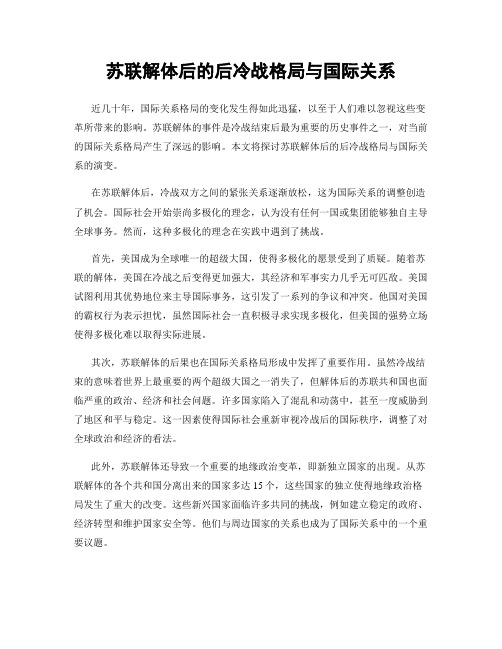
苏联解体后的后冷战格局与国际关系近几十年,国际关系格局的变化发生得如此迅猛,以至于人们难以忽视这些变革所带来的影响。
苏联解体的事件是冷战结束后最为重要的历史事件之一,对当前的国际关系格局产生了深远的影响。
本文将探讨苏联解体后的后冷战格局与国际关系的演变。
在苏联解体后,冷战双方之间的紧张关系逐渐放松,这为国际关系的调整创造了机会。
国际社会开始崇尚多极化的理念,认为没有任何一国或集团能够独自主导全球事务。
然而,这种多极化的理念在实践中遇到了挑战。
首先,美国成为全球唯一的超级大国,使得多极化的愿景受到了质疑。
随着苏联的解体,美国在冷战之后变得更加强大,其经济和军事实力几乎无可匹敌。
美国试图利用其优势地位来主导国际事务,这引发了一系列的争议和冲突。
他国对美国的霸权行为表示担忧,虽然国际社会一直积极寻求实现多极化,但美国的强势立场使得多极化难以取得实际进展。
其次,苏联解体的后果也在国际关系格局形成中发挥了重要作用。
虽然冷战结束的意味着世界上最重要的两个超级大国之一消失了,但解体后的苏联共和国也面临严重的政治、经济和社会问题。
许多国家陷入了混乱和动荡中,甚至一度威胁到了地区和平与稳定。
这一因素使得国际社会重新审视冷战后的国际秩序,调整了对全球政治和经济的看法。
此外,苏联解体还导致一个重要的地缘政治变革,即新独立国家的出现。
从苏联解体的各个共和国分离出来的国家多达15个,这些国家的独立使得地缘政治格局发生了重大的改变。
这些新兴国家面临许多共同的挑战,例如建立稳定的政府、经济转型和维护国家安全等。
他们与周边国家的关系也成为了国际关系中的一个重要议题。
在这种情况下,国际社会开始更为重视地区合作和跨国组织的作用。
例如,欧洲联盟在苏联解体后逐渐扩大,致力于加强欧洲国家之间的经济和政治合作。
同时,联合国和其他国际组织也成为促进国际合作和解决跨国问题的重要平台。
通过这些机制,国际社会试图共同应对全球性问题,维护国际和平与安全。
15里根、老布什、克林顿、小布什时期的外交政策

五、80年代中期开始美苏关系再次缓和1
1、戈尔巴乔夫的“改革与新思维” :自70 年代中期起,它的经济增长速度明显放慢, 在经济实力和科技水平方面,同美国的差 距出现重新拉大的趋势。
一、超越遏制战略
1989年布什上台后,依据已经变化的国际 形势,在里根的战略构想上作了进一步调 整,并提出了“超越遏制”战略。
该战略强调在不放弃对前苏联军事遏制的 同时,抓住前苏联、东欧国家实行“改革” 之机,充分发挥美国和西方的优势,更多 地运用政治、经济、文化、意识形态等手 段,同前苏联展开全方位的争夺。其中突 出的是以经济援助为诱饵,以和平演变的 方式将前苏联、东欧以及其他社会主义国 家逐步“融合”到西方的经济、政治体系 中。
该计划的目标,是要通过这一计划的实施, 带动一大批高技术群的发展,以保持美国 在经济、军事、科技等方面领先地位,同 时可以拖垮苏联国力。
四、里根主义
1、1981年,里根的第一任国务卿亚力山大·黑格声 明,苏联必须明白它在第三世界国家中不受抵制 的冒险时代已经结束。于是,在第一届里根政府 时期,美国对韩国、菲律宾、南非种族主义政权 和中美洲右翼军事独裁政权的支持达到了顶点。
二、地区防务战略
1992年2月,国防部长切尼正式将布什政府 的军事战略定名为“地区防务战略”。
主要内容:以地区性军事强国为主要作战 对象,重点准备打局部战争;建立侧重于 对付有限的弹道导弹攻击的战略防御系统;
在军队建设上,缩小规模,提高质量,重 点发展高技术武器装备;在兵力部署上, 缩减海外驻军和基地,在关键地区保持前 沿存在;在战争准备上,着重增强部队的 随时动员、快速反应和重建能力。
二战后美苏冷战时期的国际关系

二战后美苏冷战时期的国际关系二战结束后,世界进入了一个全新的历史时期,即美苏冷战时期。
这段时期持续了近五十年,对于国际关系产生了深远的影响。
本文将从多个角度探讨二战后美苏冷战时期的国际关系,包括两个超级大国之间的对抗、军备竞赛、代理战争以及冷战结束后的后果。
在冷战时期,美国和苏联是世界上最强大的两个国家。
这两个超级大国之间的对抗是冷战的核心。
尽管二战中两国曾合作对抗纳粹德国,但战后的意识形态差异导致了两国之间的对抗。
美国主张资本主义和民主制度,而苏联则奉行社会主义和共产主义。
这种意识形态上的冲突使得两国在经济、政治和军事领域竞相争夺全球影响力。
冷战时期,美苏两国之间的军备竞赛也是显著的特点之一。
这场竞赛使得两国在核武器和常规武器方面投入了大量资源。
双方都试图通过拥有更多的核武器来争夺战略优势。
这种军备竞赛带来了巨大的军费开支,给两个国家的经济带来了巨大压力。
尽管没有爆发全面核战争,但军备竞赛对于世界的稳定产生了严重威胁。
代理战争也是冷战时期国际关系的重要组成部分。
美苏两国虽然没有直接交战,但通过支持各自的盟友和代理人,在全球范围内进行了一系列的冲突和对抗。
例如,苏联支持北越在越南战争中对抗美国和南越。
而美国则在中东和拉丁美洲支持反共政权对抗苏联的影响。
这些代理战争使得冷战的影响波及全球,并给世界各地带来了巨大的恐慌和不安。
然而,冷战的结束也导致了国际关系的一系列变化。
苏联的解体标志着冷战的结束,美国成为了唯一的超级大国。
这一变化给世界带来了新的挑战和机遇。
冷战结束后,国际关系主要由经济和地缘政治来主导。
全球化进程加快,国际组织的作用也日益显现。
然而,美苏冷战留下的影响仍然存在,例如国际核不扩散体系的建立和裁军的努力。
总的来说,冷战时期的国际关系影响深远,塑造了现代世界的格局。
美苏两个超级大国之间的对抗、军备竞赛、代理战争以及冷战结束后对国际关系的影响,都是这一时期的重要特点。
虽然冷战已经结束,但对于国际关系的理解和研究仍然具有重要意义。
学案6:第4课 两极格局的结束
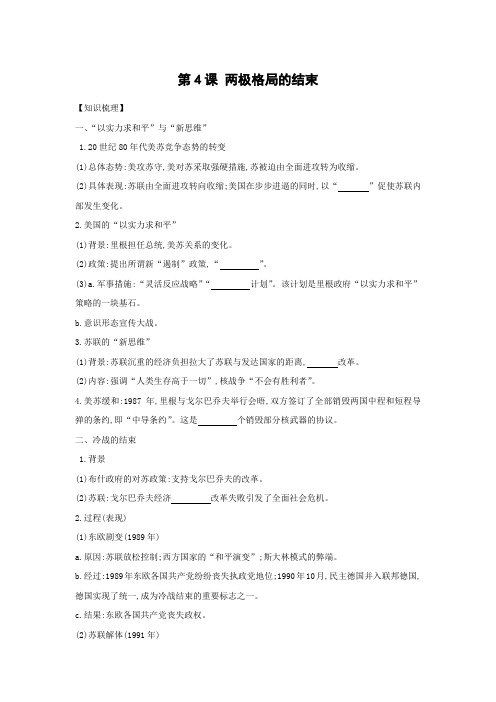
第4课两极格局的结束【知识梳理】一、“以实力求和平”与“新思维”1.20世纪80年代美苏竞争态势的转变(1)总体态势:美攻苏守,美对苏采取强硬措施,苏被迫由全面进攻转为收缩。
(2)具体表现:苏联由全面进攻转向收缩;美国在步步进逼的同时,以“”促使苏联内部发生变化。
2.美国的“以实力求和平”(1)背景:里根担任总统,美苏关系的变化。
(2)政策:提出所谓新“遏制”政策,“”。
(3)a.军事措施:“灵活反应战略”“计划”。
该计划是里根政府“以实力求和平”策略的一块基石。
b.意识形态宣传大战。
3.苏联的“新思维”(1)背景:苏联沉重的经济负担拉大了苏联与发达国家的距离, 改革。
(2)内容:强调“人类生存高于一切”,核战争“不会有胜利者”。
4.美苏缓和:1987年,里根与戈尔巴乔夫举行会晤,双方签订了全部销毁两国中程和短程导弹的条约,即“中导条约”。
这是个销毁部分核武器的协议。
二、冷战的结束1.背景(1)布什政府的对苏政策:支持戈尔巴乔夫的改革。
(2)苏联:戈尔巴乔夫经济改革失败引发了全面社会危机。
2.过程(表现)(1)东欧剧变(1989年)a.原因:苏联放松控制;西方国家的“和平演变”;斯大林模式的弊端。
b.经过:1989年东欧各国共产党纷纷丧失执政党地位;1990年10月,民主德国并入联邦德国,德国实现了统一,成为冷战结束的重要标志之一。
c.结果:东欧各国共产党丧失政权。
(2)苏联解体(1991年)a.内部原因: 上的弊端和政策上的错误,戈尔巴乔夫的改革从根本上否定社会主义。
b.外部原因:西方资本主义国家对苏联实行“”战略。
c.过程:“”事件;签署《建立独立国家联合体协议》,建立 ,苏联至此完全解体。
d.实质:社会制度发生根本性变化;独联体建立,国家解体。
e.影响:冷战结束,两极格局瓦解。
三、美苏关系发展变化带来的启示1.美苏激烈对抗造成的消极影响(1)美苏激烈对抗对人类安全与世界和平造成巨大的威胁,也造成地区局势的动荡与紧张,甚至战争灾难。
冷战时期背景下的美苏关系

冷战时期背景下的美苏关系冷战时期,是指二战后由于美国与苏联之间在意识形态、经济、军事等多个领域的对抗而形成的一种局面。
这种局面一直持续到苏联解体之前。
背景分析冷战的背景非常复杂,其中一些因素包括社会主义和资本主义的对立,在二战之后的战后重建计划以及美国对苏联的疑虑等。
社会主义和资本主义的对立二战结束后,世界出现了两个对立的意识形态阵营,即美国领导的资本主义世界和苏联领导的社会主义世界。
这两个阵营之间的分歧迅速扩大,导致了长时间的敌对状态。
战后重建计划由于战争对欧洲和亚洲的工业、交通和基础设施造成了严重破坏,因此,美国推出了一个名为马歇尔计划的战后重建计划,旨在为摆脱破坏和贫穷的欧洲国家提供经济援助。
但是,苏联拒绝参与计划,并批评该计划是美国的一种经济侵略。
美国对苏联的疑虑在战争结束后,苏联逐渐扩大国际领土,导致美国对苏联的扩张采取非常谨慎的态度。
美国认为苏联的扩张是一种威胁,因此美国采取了许多措施来限制苏联的势力范围。
美苏间军事对立美苏之间的军事对立一直是冷战的一个重要方面。
美国和苏联都感到对方的军事扩张是一种威胁,因此两国都在不断调整和完善自己的军备。
这种军备竞赛导致了危险的核军备竞赛,使整个世界处于不断升级的军备对峙中。
另一方面,美国也采取了一些秘密和可疑的行动,比如对其他国家进行“秘密战争”,援助政治倾向相同的政府,并采取一些其它手段来遏制苏联。
美苏的外交策略在冷战的背景下,美苏之间的外交策略也发生了变化。
美国采取了一种叫做“遏制政策”的战略,旨在限制苏联的扩张能力。
它包括经济制裁、政治收买和军事威慑等手段。
苏联则采取一种更为积极的扩张策略,试图通过软实力和军事力量扩大其政治地位。
美苏的关系在世界范围内起到了很大的影响。
它们的对立促进了走向全球化的历程,并构建了世界的多极化格局。
当然,美苏的对立也给人类带来了巨大的损失和危机。
现在,随着国际事务的不断变化,美国和俄罗斯已成为全球性质独立国家的重要成员,在全球的和平、安全和发展中都发挥着重要的作用。
冷战结束后,美国对外战略的调整

冷战结束后,美国对外战略的调整摘要两极格局解体,冷战结束后,美国与西欧,日本,俄罗斯,中国等构成“一超多强”的国际政治力量结构,世界格局向多极化方向发展。
美国作为唯一的超级大国,积极调整对外战略来适应国际环境的变化,维护美国的领导地位。
关键词:冷战结束;美国;对外战略调整苏联解体标志着冷战结束,宣告了“美苏争霸”的两级格局结束,世界格局逐步向多极化方向发展。
面对这一迅猛的国际形势,美国作为世界上唯一的超级大国不能不对战后持续40多年的全球战略进行全面的根本性的调整,以寻找新的范式替代反共产主义的“遏制战略”,实现美国治下的和平。
本文将从布什政府时期,克林顿政府,小布什政府以及现在的奥巴马执政时期来分析美国在冷战结束后不同时期如何调整对外战略来适应国际环境的变化,维护其领导地位。
一布什政府时期布什总统任期内,跨越冷战前后两个时期,美国的全球战略有了很大变化。
①1989年初,提出了超越遏制战略。
所谓“超越遏制战略”是指:在不放弃军事遏制的条件下,以经济援助为诱饵,以“和平演变”为灵魂,抓住社会主义国家进行改革开放的有利时机,通过政治、经济、思想、文化、外交等非军事手段,推行美国的价值观和政治经济模式,培养社会主义国家内部的亲西方的反对派,最终将苏联东欧纳入西方体系。
②1989年底,提出了建立欧洲新格局的“新大西洋主义”:主张把北约、欧共体、欧安会三大机制作为建立欧洲新格局的基础,其实质是要在重塑欧洲格局的过程中保持和加强美国的领导地位,确保美国在欧洲的政治、经济利益。
3提出美国“世界新秩序”的主张,实质是要在美国的领导下按照美国的价值观改造世界。
强调在美国的领导下,实现一个“和平和安全、自由和法治”的世界;(2)在国际事务中更加强调“多边”合作,而不是“单边”行动,注重发挥盟国和联合国的作用;(3)按照美国的价值观和理想,建立新的国际体系,在世界上巩固和推进所谓“自由”与“民主”事业;(4)实施地区防务战略,重点防止和应对威胁美国利益的地区冲突。
冷战后美国的外交战略
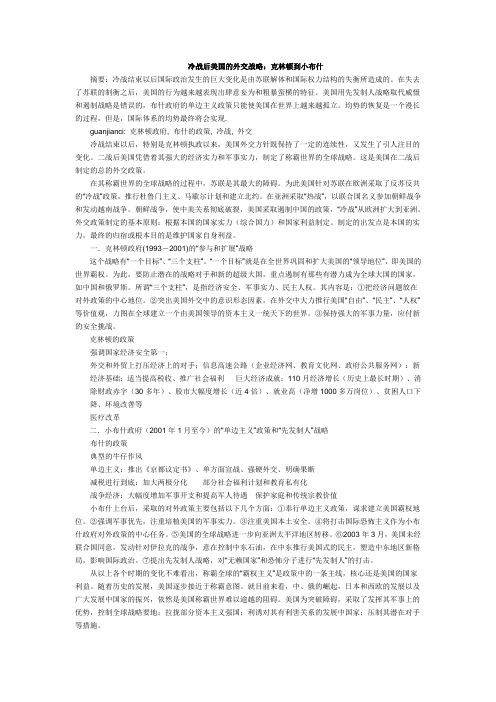
冷战后美国的外交战略:克林顿到小布什摘要:冷战结束以后国际政治发生的巨大变化是由苏联解体和国际权力结构的失衡所造成的。
在失去了苏联的制衡之后,美国的行为越来越表现出肆意妄为和粗暴蛮横的特征。
美国用先发制人战略取代威慑和遏制战略是错误的,布什政府的单边主义政策只能使美国在世界上越来越孤立。
均势的恢复是一个漫长的过程,但是,国际体系的均势最终将会实现.guanjianci: 克林顿政府, 布什的政策, 冷战, 外交冷战结束以后,特别是克林顿执政以来,美国外交方针既保持了一定的连续性,又发生了引人注目的变化。
二战后美国凭借着其强大的经济实力和军事实力,制定了称霸世界的全球战略。
这是美国在二战后制定的总的外交政策。
在其称霸世界的全球战略的过程中,苏联是其最大的障碍。
为此美国针对苏联在欧洲采取了反苏反共的“冷战”政策,推行杜鲁门主义、马歇尔计划和建立北约。
在亚洲采取“热战”,以联合国名义参加朝鲜战争和发动越南战争。
朝鲜战争,使中美关系彻底破裂,美国采取遏制中国的政策,“冷战”从欧洲扩大到亚洲。
外交政策制定的基本原则:根据本国的国家实力(综合国力)和国家利益制定。
制定的出发点是本国的实力,最终的归宿或根本目的是维护国家自身利益。
一.克林顿政府(1993-2001)的“参与和扩展”战略这个战略有“一个目标”、“三个支柱”。
“一个目标”就是在全世界巩固和扩大美国的“领导地位”,即美国的世界霸权。
为此,要防止潜在的战略对手和新的超级大国,重点遏制有那些有潜力成为全球大国的国家,如中国和俄罗斯。
所谓“三个支柱”,是指经济安全、军事实力、民主人权。
其内容是:①把经济问题放在对外政策的中心地位。
②突出美国外交中的意识形态因素,在外交中大力推行美国“自由”、“民主”、“人权”等价值观,力图在全球建立一个由美国领导的资本主义一统天下的世界。
③保持强大的军事力量,应付新的安全挑战。
克林顿的政策强调国家经济安全第一;外交和外贸上打压经济上的对手;信息高速公路(企业经济网、教育文化网、政府公共服务网):新经济基础;适当提高税收、推广社会福利巨大经济成就:110月经济增长(历史上最长时期)、消除财政赤字(30多年)、股市大幅度增长(近4倍)、就业高(净增1000多万岗位)、贫困人口下降、环境改善等医疗改革二.小布什政府(2001年1月至今)的“单边主义”政策和“先发制人”战略布什的政策典型的牛仔作风单边主义:推出《京都议定书》、单方面宣战、强硬外交、明确果断减税进行到底:加大两极分化部分社会福利计划和教育私有化战争经济:大幅度增加军事开支和提高军人待遇保护家庭和传统宗教价值小布什上台后,采取的对外政策主要包括以下几个方面:①奉行单边主义政策,谋求建立美国霸权地位。
冷战时期美苏两国的外交政策及影响

冷战时期美苏两国的外交政策及影响冷战时期,美国和苏联两个超级大国展开了几十年的角逐。
为了争夺全球霸权地位,两国相互斗争,不断采取各种外交手段,这些手段不仅上演了一幕幕耸人听闻的国际事件,也对国际关系产生了深远影响。
本文将从两国的外交政策及其影响两个方面展开深入探讨。
一、美苏外交政策1. 美国外交政策在冷战的初期,美国采取的是遏制苏联的政策,即封锁苏联在国际上的发展空间,在全球范围内与苏联展开一系列的政治,军事和经济斗争。
美国制订的主要政策如下:(1)麦克阿瑟政策:美国总统杜鲁门任命麦克阿瑟将军负责监督日本的复兴,并协助日本成为一个自由的民主国家。
麦克阿瑟计划在日本实施的政策大量借鉴了美国的民主制度,以期让日本成为一个忠实的美国盟友,同时阻止苏联向日本伸出阴影。
(2)当务之急政策:这是指美国政府在二战后对全球局势的迅速反应和处理。
在这个计划中,美国制定了一系列的行动,岁片化和重组部队、安抚盟友、封堵苏联的行动等等,从多方面应对苏联扩张的战略。
(3)反共政策:美国政府实施的反共政策,其目的就是为了遏制苏联在全球范围内扩张的势头。
在这个计划中,美国通过政治、经济、军事等多个方面,力图将苏联困于一隅,阻止其进一步扩张。
其中最典型的事件就是朝鲜战争,美国领导了联合国军对朝鲜进行了长达三年的战争,最终取得了胜利,也以此为契机在韩国建立了一个美国的军事基地。
2. 苏联外交政策在冷战时期,苏联外交政策的基调是“反美亲苏”。
苏联政府指责美国干涉其内政、破坏全球和平,因此苏联必须与美国保持戒备和敌对,采取与美国相对抗的政策。
苏联外交政策的主要特征如下:(1)斯大林主义政策:这种政策的基本思想是通过所有手段实现宣传、间谍和暴力斗争来揭示和抵制资本主义国家的企图。
斯大林主义政策强调了防御性和反基督教。
(2)新列宁主义政策:苏联领导人赫鲁晓夫提出的新列宁主义政策,设法扩大苏联与西方国家之间的贸易和民间交流,在经济发展方面逐渐舍弃早期的封闭策略,但是在军事上仍然对西方国家抱有敌意。
二战后的冷战美苏两强对抗

二战后的冷战美苏两强对抗冷战是指二战结束后,苏联和美国之间在政治、经济、军事等方面的对抗和竞争。
这场冲突持续了数十年,对世界格局产生了深远的影响。
本文将从不同的角度分析冷战美苏两强对抗。
一、政治上的对抗在二战后不久,美苏两国在政治上就开始了明显的对抗。
苏联推行共产主义的扩张政策,试图在全球范围内推广社会主义,而美国则以资本主义为基础,积极阻止苏联的扩张,并试图在国际社会上争取更多的盟友。
这导致了两国在国际事务中的对立态势。
二、经济上的竞争冷战期间的美苏两国也在经济上进行了剧烈的竞争。
美国通过马歇尔计划等援助计划,积极支持欧洲国家的经济重建,以遏制苏联在欧洲的影响力。
苏联则通过实行计划经济,加强其军事实力,以及对发展中国家的援助来巩固其地位。
这种经济上的竞争极大地刺激了两国之间的对抗。
三、军事上的竞争冷战时期,美苏两国之间的军事对抗也是激烈的。
两国相继研发了核武器,导致了核武器的大规模扩散。
同时,两国还进行了军备竞赛,争夺军事技术和军事基地的建设。
美苏两国之间的军事对抗达到了空前的程度,给世界带来了严重的安全威胁。
四、全球影响力的争夺冷战期间,美苏两国还通过支持各种政权来争夺全球的影响力。
美国支持了许多西方国家的民主化进程,加强了西方的阵营。
苏联则通过支持亚非拉国家的民族解放运动,争取这些国家的支持。
两国之间的这种竞争导致了世界范围内的地缘政治紧张局势。
五、冷战的结束与后果冷战在1989年的柏林墙倒塌后才结束。
苏联的解体使得美国在全球范围内获得了更大的霸权地位。
冷战的结束标志着社会主义阵营的瓦解和资本主义制度的胜利。
然而,冷战给世界带来了严重的经济浪费和安全隐患,其后果至今仍在影响着我们的世界。
总结:冷战美苏两强对抗是二战后世界格局的重要组成部分,它体现了共产主义与资本主义这两种制度之间的对立与冲突。
政治、经济和军事上的对抗与竞争使得全球局势紧张,世界分为两个阵营。
冷战的结束为美国带来了更大的霸权地位,但同时也造成了巨大的经济和安全隐患。
二战以后美国全球战略的演变历程
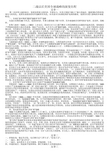
二战以后美国全球战略的演变历程文章一第二次世界大战结束后,美国凭借强大的经济、军事实力,在西方国家中确立了霸主的地位。
随着国际形势和美国实力的变化,美国各届政府的对外战略常有变化,但其基本目标都是维护美国的霸权。
美国具有重大影响的全球战略是:一、全球扩张时期的“遏制”战略和“和平”战略从战后初期到60年代末,美国的经济、军事力量称霸于整个世界,其全球战略具有鲜明的扩张性、进攻性、侵略性。
杜鲁门政府(1945——1953)上台以后,面对社会主义力量不断壮大和民族解放运动蓬勃兴起的局面,很快修改了罗斯福设想的大国合作政策,制定了以反苏、反共为中心的“遏制”战略。
其基本内容是:(1)以原子弹和美元为坚强后盾,同苏联实行全面对抗,对东欧进行颠覆,在中国支持蒋介石打内战,进而对新中国实行政治上的孤立、经济上的封锁和军事上的包围。
(2)建立资本主义阵营,实行“马歇尔计划”、“占领地区救济资金”和“经济复兴资金”,在经济上扶植西欧、日本;通过分裂德国,重新武装联邦德国,建立“北约”和缔结《日美安全条约》,形成西方军事联盟。
(3)在亚非拉广大地区,通过签订《西半球防务条约》和建立“美洲国家组织”来巩固它在“后院”的统治,通过所谓“技术援助和开发落后地区”的“第四点计划”支持亲美独裁政权,推行新殖民主义。
整个冷战时期,美国各届政府的对外政策基本没有离开“遏制”苏联这一基础。
艾森豪威尔政府(1953——1961)在朝鲜战场失败后,力图用战争以外的一切手段对付社会主义国家,先后提出了“解放战略”、“和平取胜”战略;在军事上提出了“大规模报复战略”和“战争边缘政策”,进行核讹诈和战争威胁;针对东南亚和中东局势,先后提出了“对米诺骨牌理论”和“艾森豪威尔主义”,大肆镇压民族解放运动,加紧向印度支那、中东和拉美地区渗透。
肯尼迪、约翰逊时期(1961——1969),美国的霸权地位受到挑战。
肯尼迪政府确立了“一手拿箭,一手拿橄榄枝”的“和平战略”,把对抗与缓和两手结合起来,同时注重对苏联、东欧进行经济、文化渗透,同苏联一起攻击中国。
冷战时期美苏对外政策

二、战后美国对外政策的演变第二次世界大战后,美国成为资本主义世界的霸主。
为了维护既得利益,确立全球范围内的霸权地位,在不同时期,美国政府根据需要采取了不同的对外政策。
从对外政策的内容和特点看,我们可以把它分为以下几个时期。
1.美国全球战略的确立时期(战后初期到20世纪60年代末)。
(1)“遏制战略”(1945—1952年)。
这是杜鲁门政府推行的军事战略。
战略的要点是,孤立打击和遏制苏联等社会主义,制造冷战气氛,控制西欧向第三世界扩张,争夺世界霸权,建立全球包围社会主义国家的环型军事基地网。
(2)“解放战略”(1953—1960年)。
这是艾森豪威尔1953年上台后推行的军事战略。
“遏制战略”并没有收到好的效果,因此实施“解放战略”,主张把社会主义因素“从共产党的统治下解放出来”,其主要内容是,通过“政治战”、“心理战”、“宣传战”和平演变以苏联为首的社会主义,武装德国,加强北约,扩充军备对抗苏联,对“中间地带”推行扩张政策。
(3)“和平战略”(1961—1968年)。
这是肯尼迪、约翰逊政府推行的军事战略,又称“灵活反应战略”。
这一战略从称霸世界指导思想出发,以不同方式应付不同威胁,以和平为幌子,推备打各种战争,镇压世界各国的民族解放运动,抵制中国与苏联的影响。
2.美国全球战略的调整时期(20世纪70年代) (1)“现实威慑”战略(1969—1974年)。
这是尼克松政府推行的军事战略。
战略的主要内容是,利用中苏矛盾,借助盟军力量,重点加强欧洲主战场美军的实力,重振争夺世界霸权的野心。
(2)“世界秩序战略”(1977—1980年)。
这是卡特1977年出任总统提出的新战略。
战略主要内容是:加强美、欧、日的合作,形成战略上的一致对苏,以“人权外交”发展同世界各国的关系,树立美国的民主、人道的国际形象,借助中国的战略地位和力量抗衡苏联。
3.美国全球战略的发展(20世纪80、如年代)。
里根上任之初,美国内外交困。
冷战的结束苏联解体与美国的全球霸权

冷战的结束苏联解体与美国的全球霸权冷战的结束:苏联解体与美国的全球霸权随着1989年柏林墙的倒塌和1991年苏联的解体,冷战时期长达数十年的对抗局面终于迎来了一个重要的转折点。
苏联的解体不仅标志着一个世界性的政治实体的消失,也为现代国际关系格局带来了巨大的变化。
在这一新的格局下,美国迅速崛起为全球霸权。
本文将探讨冷战结束对苏联和美国的影响,以及苏联解体如何促成美国的全球霸权。
一、苏联解体对苏联的影响苏联解体对苏联来说是一次巨大的冲击,它导致了政治、经济和社会的深刻动荡。
1. 政治动荡:苏联解体后,原苏联加盟共和国相继独立,其中包括俄罗斯、乌克兰、白俄罗斯等地,这些共和国的分离引发了大量的内战和地区冲突。
政治权力的真空使得各地的民族主义情绪迅速崛起,造成了许多社会动荡和冲突。
2. 经济崩溃:苏联解体后,曾经构成苏联经济命脉的中央计划经济体制崩溃,用于互助贸易和资源相互补充的关系也遭受破裂。
这一连锁反应导致原苏联加盟共和国的经济陷入困境,通货膨胀、失业率飙升、国内生产力下降,引发了严重的经济危机。
3. 社会不稳定:苏联解体后,社会秩序崩溃,社会犯罪率和腐败现象急剧上升,人民生活水平普遍下降。
而解体后各共和国之间的民族纷争,种族和宗教冲突也加剧了社会不稳定。
二、苏联解体对美国的影响苏联解体的结果对美国而言是一种巨大的战略胜利,美国成为了唯一的超级大国。
1. 超级大国地位:苏联解体使得美国消除了其最强大的对手,摆脱了冷战期间与苏联的竞争。
这一消除对手的结果使美国在国际舞台上取得了霸权地位。
美国的主导地位体现在其对全球经济、政治和安全事务的影响力。
2. 经济垄断:苏联解体导致原苏联加盟共和国的经济混乱,美国积极介入并推动市场经济改革,加强了与这些国家的经济联系。
美国的跨国公司迅速进入这些市场,垄断了资源和市场份额,巩固了美国在全球经济中的地位。
3. 政治影响力的扩大:苏联解体后,东欧国家纷纷脱离苏联势力范围,向西方靠拢并加入北约。
二战后国际关系中美苏矛盾的演变与影响
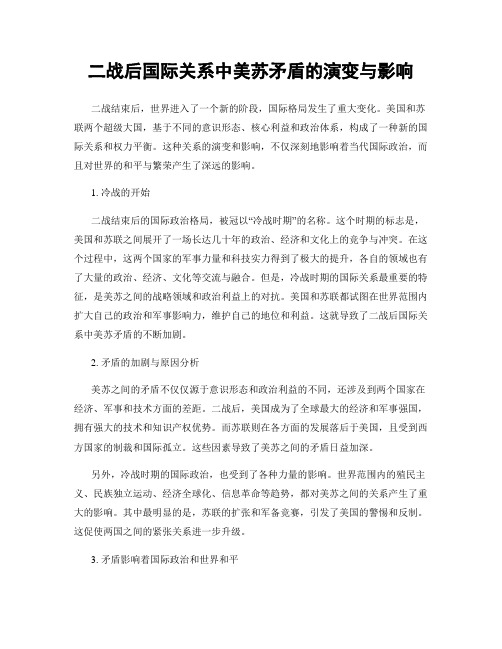
二战后国际关系中美苏矛盾的演变与影响二战结束后,世界进入了一个新的阶段,国际格局发生了重大变化。
美国和苏联两个超级大国,基于不同的意识形态、核心利益和政治体系,构成了一种新的国际关系和权力平衡。
这种关系的演变和影响,不仅深刻地影响着当代国际政治,而且对世界的和平与繁荣产生了深远的影响。
1. 冷战的开始二战结束后的国际政治格局,被冠以“冷战时期”的名称。
这个时期的标志是,美国和苏联之间展开了一场长达几十年的政治、经济和文化上的竞争与冲突。
在这个过程中,这两个国家的军事力量和科技实力得到了极大的提升,各自的领域也有了大量的政治、经济、文化等交流与融合。
但是,冷战时期的国际关系最重要的特征,是美苏之间的战略领域和政治利益上的对抗。
美国和苏联都试图在世界范围内扩大自己的政治和军事影响力,维护自己的地位和利益。
这就导致了二战后国际关系中美苏矛盾的不断加剧。
2. 矛盾的加剧与原因分析美苏之间的矛盾不仅仅源于意识形态和政治利益的不同,还涉及到两个国家在经济、军事和技术方面的差距。
二战后,美国成为了全球最大的经济和军事强国,拥有强大的技术和知识产权优势。
而苏联则在各方面的发展落后于美国,且受到西方国家的制裁和国际孤立。
这些因素导致了美苏之间的矛盾日益加深。
另外,冷战时期的国际政治,也受到了各种力量的影响。
世界范围内的殖民主义、民族独立运动、经济全球化、信息革命等趋势,都对美苏之间的关系产生了重大的影响。
其中最明显的是,苏联的扩张和军备竞赛,引发了美国的警惕和反制。
这促使两国之间的紧张关系进一步升级。
3. 矛盾影响着国际政治和世界和平冷战时期的美苏之间的矛盾,不仅引发了一系列世界范围内的地缘政治危机,还对国际政治和世界和平产生了深刻影响。
其中最明显的是,美苏之间的核武器竞赛,给全球战争带来了极大的风险和不稳定因素。
无论是古巴导弹危机还是核军备竞赛,都让人们深刻感受到了核武器的可怕威力和不良后果。
美国和苏联之间的矛盾,让整个国际政治陷入了一片紧张和动荡的氛围。
冷战后国际关系 第二讲 冷战结束对国际关系的影响
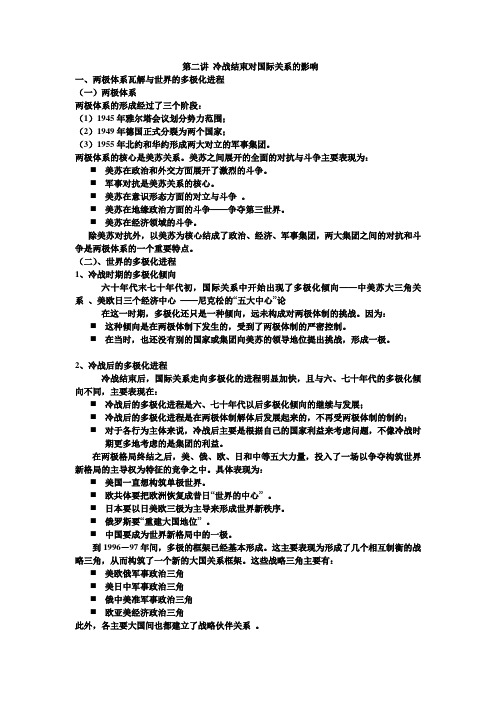
第二讲冷战结束对国际关系的影响一、两极体系瓦解与世界的多极化进程(一)两极体系两极体系的形成经过了三个阶段:(1)1945年雅尔塔会议划分势力范围;(2)1949年德国正式分裂为两个国家;(3)1955年北约和华约形成两大对立的军事集团。
两极体系的核心是美苏关系。
美苏之间展开的全面的对抗与斗争主要表现为:⏹美苏在政治和外交方面展开了激烈的斗争。
⏹军事对抗是美苏关系的核心。
⏹美苏在意识形态方面的对立与斗争。
⏹美苏在地缘政治方面的斗争——争夺第三世界。
⏹美苏在经济领域的斗争。
除美苏对抗外,以美苏为核心结成了政治、经济、军事集团,两大集团之间的对抗和斗争是两极体系的一个重要特点。
(二)、世界的多极化进程1、冷战时期的多极化倾向六十年代末七十年代初,国际关系中开始出现了多极化倾向——中美苏大三角关系、美欧日三个经济中心——尼克松的“五大中心”论在这一时期,多极化还只是一种倾向,远未构成对两极体制的挑战。
因为:⏹这种倾向是在两极体制下发生的,受到了两极体制的严密控制。
⏹在当时,也还没有别的国家或集团向美苏的领导地位提出挑战,形成一极。
2、冷战后的多极化进程冷战结束后,国际关系走向多极化的进程明显加快,且与六、七十年代的多极化倾向不同,主要表现在:⏹冷战后的多极化进程是六、七十年代以后多极化倾向的继续与发展;⏹冷战后的多极化进程是在两极体制解体后发展起来的,不再受两极体制的制约;⏹对于各行为主体来说,冷战后主要是根据自己的国家利益来考虑问题,不像冷战时期更多地考虑的是集团的利益。
在两极格局终结之后,美、俄、欧、日和中等五大力量,投入了一场以争夺构筑世界新格局的主导权为特征的竞争之中。
具体表现为:⏹美国一直想构筑单极世界。
⏹欧共体要把欧洲恢复成昔日“世界的中心”。
⏹日本要以日美欧三极为主导来形成世界新秩序。
⏹俄罗斯要“重建大国地位”。
⏹中国要成为世界新格局中的一极。
到1996-97年间,多极的框架已经基本形成。
冷战时期美苏关系的变化
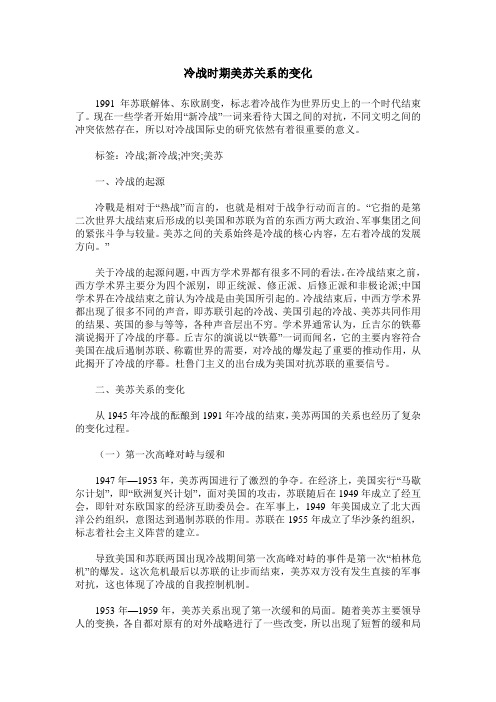
冷战时期美苏关系的变化1991年苏联解体、东欧剧变,标志着冷战作为世界历史上的一个时代结束了。
现在一些学者开始用“新冷战”一词来看待大国之间的对抗,不同文明之间的冲突依然存在,所以对冷战国际史的研究依然有着很重要的意义。
标签:冷战;新冷战;冲突;美苏一、冷战的起源冷戰是相对于“热战”而言的,也就是相对于战争行动而言的。
“它指的是第二次世界大战结束后形成的以美国和苏联为首的东西方两大政治、军事集团之间的紧张斗争与较量。
美苏之间的关系始终是冷战的核心内容,左右着冷战的发展方向。
”关于冷战的起源问题,中西方学术界都有很多不同的看法。
在冷战结束之前,西方学术界主要分为四个派别,即正统派、修正派、后修正派和非极论派;中国学术界在冷战结束之前认为冷战是由美国所引起的。
冷战结束后,中西方学术界都出现了很多不同的声音,即苏联引起的冷战、美国引起的冷战、美苏共同作用的结果、英国的参与等等,各种声音层出不穷。
学术界通常认为,丘吉尔的铁幕演说揭开了冷战的序幕。
丘吉尔的演说以“铁幕”一词而闻名,它的主要内容符合美国在战后遏制苏联、称霸世界的需要,对冷战的爆发起了重要的推动作用,从此揭开了冷战的序幕。
杜鲁门主义的出台成为美国对抗苏联的重要信号。
二、美苏关系的变化从1945年冷战的酝酿到1991年冷战的结束,美苏两国的关系也经历了复杂的变化过程。
(一)第一次高峰对峙与缓和1947年—1953年,美苏两国进行了激烈的争夺。
在经济上,美国实行“马歇尔计划”,即“欧洲复兴计划”,面对美国的攻击,苏联随后在1949年成立了经互会,即针对东欧国家的经济互助委员会。
在军事上,1949年美国成立了北大西洋公约组织,意图达到遏制苏联的作用。
苏联在1955年成立了华沙条约组织,标志着社会主义阵营的建立。
导致美国和苏联两国出现冷战期间第一次高峰对峙的事件是第一次“柏林危机”的爆发。
这次危机最后以苏联的让步而结束,美苏双方没有发生直接的军事对抗,这也体现了冷战的自我控制机制。
冷战时期的美苏关系及其冲突
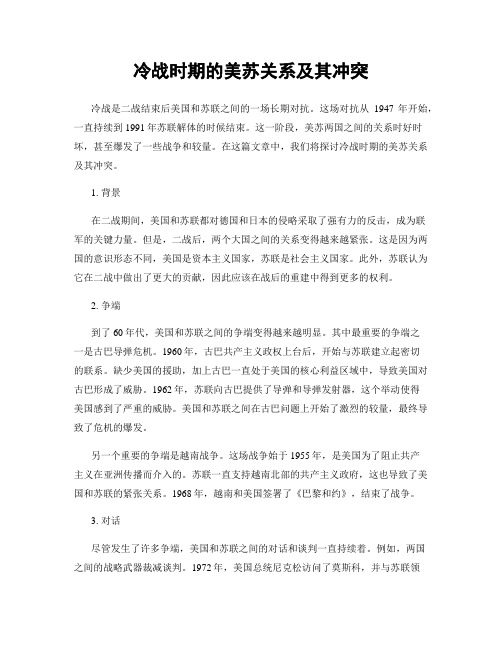
冷战时期的美苏关系及其冲突冷战是二战结束后美国和苏联之间的一场长期对抗。
这场对抗从1947年开始,一直持续到1991年苏联解体的时候结束。
这一阶段,美苏两国之间的关系时好时坏,甚至爆发了一些战争和较量。
在这篇文章中,我们将探讨冷战时期的美苏关系及其冲突。
1. 背景在二战期间,美国和苏联都对德国和日本的侵略采取了强有力的反击,成为联军的关键力量。
但是,二战后,两个大国之间的关系变得越来越紧张。
这是因为两国的意识形态不同,美国是资本主义国家,苏联是社会主义国家。
此外,苏联认为它在二战中做出了更大的贡献,因此应该在战后的重建中得到更多的权利。
2. 争端到了60年代,美国和苏联之间的争端变得越来越明显。
其中最重要的争端之一是古巴导弹危机。
1960年,古巴共产主义政权上台后,开始与苏联建立起密切的联系。
缺少美国的援助,加上古巴一直处于美国的核心利益区域中,导致美国对古巴形成了威胁。
1962年,苏联向古巴提供了导弹和导弹发射器,这个举动使得美国感到了严重的威胁。
美国和苏联之间在古巴问题上开始了激烈的较量,最终导致了危机的爆发。
另一个重要的争端是越南战争。
这场战争始于1955年,是美国为了阻止共产主义在亚洲传播而介入的。
苏联一直支持越南北部的共产主义政府,这也导致了美国和苏联的紧张关系。
1968年,越南和美国签署了《巴黎和约》,结束了战争。
3. 对话尽管发生了许多争端,美国和苏联之间的对话和谈判一直持续着。
例如,两国之间的战略武器裁减谈判。
1972年,美国总统尼克松访问了莫斯科,并与苏联领导人签署了一项《苏美战略武器裁减条约》。
这个条约是冷战时期最为重要的外交成就之一。
此外,还有一些其他的对话和谈判,例如关于军控、人权、双边关系和区域安全等问题的谈判。
这些谈判并没有解决所有的问题,但它们能够有效地缓和紧张关系。
4. 结论在冷战时期,美苏之间的关系充满了紧张和对抗。
争端和冲突时有发生,但通过对话和谈判,两国能够在某种程度上解决一些问题。
专题五:冷战时期美苏关系的演变
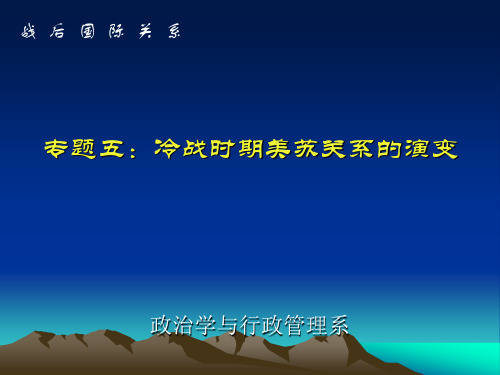
专题五:冷战时期美苏关系的演变
政治学与行政管理系
冷战时期美苏关系的演变:总体描述
影响战后国际关系全局的两个超级大国
20世纪上半期开始,无休止的斗争
“十月革命”胜利后,美国仇恨苏联,武装干涉 美国1933年同苏联正式建交,西方大国中最后一个承认苏联
此后,美国仍没有放弃要削弱和搞垮苏联
•
70年代的美苏争霸
• 《七十年代美国的对外政策:争取和平的新战略》 这篇咨文把尼克松的关岛讲话扩大为美国的全球 政策。咨文的开头就说:"这是本政府适应国际关系 新时代的对外政策新方针的声明。"这项政策声明 宣布美国决定改变战后 "支配一切的状况,来适应 今天的环境",提出把 "伙伴关系"、"实力"和谈判" 作为尼克松主义的"三根支柱"。这三者的关系和 含意是,美国继续从实力地位出发,通过对话和 谈判稳住苏联;承认西欧、日本同美国的平等地位, 即"伙伴关系",来获得盟国的支持,牵制苏联;同 时再利用中国同苏联的矛盾,制约苏联,使美国 在外交上有更大的主动权。
(三)美苏之间的 两场危机
第二次柏林危机
古巴导弹危机
二、70年代: 美苏争霸
(一)美国战略大调整
基本原因
尼克松对外新战略
(二)苏联的进攻性 战略和扩张攻势
福特卡特对苏政策
缓和战略
经济战略 (三)美苏战略 态势的易位
军事战略
苏联劣势转为均势, 甚至优势
苏联向第三世界 的扩张攻势
70年代的美苏争霸
• • • • • • 1.美国战略的大调整 1)战略调整的基本原因 侵朝、侵越战争的失败; 实力地位的下降; 盟国关系的变化; 中国同苏联的决裂。
战后国际关系史

第二讲冷战时期的大国关系(美苏关系)(补充内容)三、七十年代的美苏关系•在七十年代,美苏关系的最大特点就是处在冷战时期的缓和阶段。
•“缓和”(détente)是指国际关系中两国或多国之间紧张关系的松弛,从而减少战争的可能性。
•缓和在美苏关系的历史进程始于古巴导弹危机之后,成熟于尼克松、福特政府时期,终结于卡特政府时期。
1、美苏关系缓和的国际背景核恐怖的震慑作用美苏力量对比的变化多极化倾向的出现2、美苏缓和的国内驱动力美苏都被激烈的军备竞赛搞得负担沉重。
而经济的困境要求美苏放慢军备竞赛的步伐,适当控制核武器的发展,而这只有通过谈判才能做到。
3、美苏缓和的实现美苏缓和是美苏调整外交政策的结果:(1)“关岛主义”、“尼克松主义”(2)苏联的“缓和战略”4、美苏关系缓和的表现政治缓和军备控制危机处理经贸、文化交流5、美苏缓和的终结——“卡特主义”的出笼6、美苏缓和的影响:•美苏缓和维持了美苏之间的战略均势,而这种均势为世界和平提供了一定的保证。
•美苏缓和也促动了国际格局的变化——多极化倾向的发展。
•美苏缓和带动了东西方关系的缓和以及整个世界局势的缓和。
四、八十年代的美苏关系八十年代的美苏关系,主要指的是里根时期的美苏关系。
里根时期美苏关系的特点是:第一任期与苏联全面对抗,也称“新冷战”时期;第二任期与苏联开始缓和,史称“新缓和”时期。
一、新冷战时期里根把遏制苏联的扩张作为其外交政策的根本任务,主张从政治、经济、军事、外交以及意识形态等各方面对苏联进行遏制。
而苏联对于美国的遏制毫不相让,针锋相对。
美国的政策具体表现为:1、大力支持阿富汗和波兰的反苏行动;——阿富汗——波兰2、军备竞赛——“星球大战计划”3、技术战和经济战4、在全球的激烈争夺(1)在欧洲的争夺(2)在第三世界的争夺5、意识形态领域的斗争美国的“和平演变战略”二、新缓和时期在里根第二任期,美苏关系进入了“新缓和时期”。
具体表现:1、频繁的首脑会晤2、在对第三世界的争夺中采取强硬姿态——“里根主义”3、军控领域的对话与谈判4、阿富汗问题的解决•布什政府的“超越遏制战略”“超越遏制”战略强调把苏联引入国际社会,使它在国际合作中发生演变;提出建立“一个开放、统一和自由的欧洲”;强调实力政策。
原创3:第4课 两极格局的结束
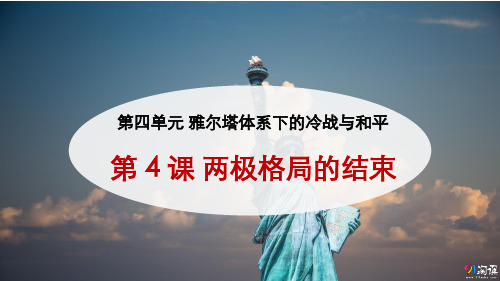
而且南斯拉夫一分为五,分为了波斯尼亚和黑塞哥维那、南斯 拉夫联盟(2003年2月4日,南斯拉夫联盟后更名为塞尔维亚和 黑山。2006年6月3日,黑山宣布独立)、斯洛文尼亚、克罗地 亚、马其顿五个国家;捷克斯洛伐克一分为二;民主德国和联 邦德国实现了统一。
苏 联 解 体
4.苏联解体 (1)经过 ①1989年波罗的海三国──立陶宛、拉脱维亚、爱沙尼亚先后 宣布脱离苏联独立,从而揭开了苏联解体的序幕。 ②1991年12月原苏联11个加盟共和国领导人排除戈尔巴乔夫, 在阿拉木图签署《建立独立国家联合体协议》,苏联至此完全 解体。
签 订 中 导 条 约
二、冷战的结束 1.布什政府的对苏政策 (1)使苏联在国际合作中发生演变。 (2)提出要建立“一个开放、统一和自由的欧洲”。 (3)强调“必须在经济上、外交上和军事上保持强大”。
冷 战 的 结 束
2.戈尔巴乔夫的改革 (1)内容
戈尔巴乔夫首先进行经济体制的改革,重点是用经济管理方法代替 原来的行政命令,这实际上是承认市场对经济的调节作用。政府还 减少了指令性计划指标,代之以指导性计划指标,通过一系列法规, 调整所有制的结构,使原来的单一的公有制经济发生了一些变化, 个体劳动者和合作社得到迅速发展,企业开始实行各种形式的承包。 戈尔巴乔夫把经济体制改革中的问题归结于政治阻力太大,为了扫 除障碍,把改革的重点转向政治领域,最终导致苏联解体。
3.两极格局解体后遗留了很多问题和潜在危机 (1)冷战思维依然影响国际社会对社会主义制度的认识,故而 使社会主义国家不能获得真正良好的、稳定的国际环境; (2)原被美苏矛盾掩盖的各种矛盾也随着滋长,如民族矛盾、 地区冲突、恐怖组织等,成为威胁和平的潜在因素; (3)随着苏联一极的崩塌,美国成为目前世界上综合国力最强 的国家,因而它在国际事务中表现出的指手画脚和恃强凌弱, 都会对国际局势造成负面影响,成为引发战争的潜在威胁。
- 1、下载文档前请自行甄别文档内容的完整性,平台不提供额外的编辑、内容补充、找答案等附加服务。
- 2、"仅部分预览"的文档,不可在线预览部分如存在完整性等问题,可反馈申请退款(可完整预览的文档不适用该条件!)。
- 3、如文档侵犯您的权益,请联系客服反馈,我们会尽快为您处理(人工客服工作时间:9:00-18:30)。
Charles Krauthammer an American columnist, author, political commentator
Charles Krauthammer "The Unipolar Moment"
Foreign Affairs, 1990/1991
Part II America’s evaluation of world situation
Francis Fukuyama an American political
Francis Fukuyama
scientist
"The End of History?"
The National Interest, Summer 1989
Part II America’s evaluation of world situation
neoisolationism : a retreat from global leadership
The US would distance itself politically, diplomatically, and militarily from the affairs of the great powers in Europe and Asia.
The US was capble of putting its moral principles into practice. 4. The “peace dividend” stemming from the collapse of the Cold
War could be used to ensure the continued spread of democratic institutions and to solve transnational problems.
Tanks in Moscow's Red Square during the 1991 coup attempt
Part I The End of the Cold War
4. On 1 December , voters in Ukraine, overwhelmingly voted to secede from the Soviet Union in a referendum. This ended any realistic chance of keeping the Soviet Union together.
2. Boris Yeltsin, then president of the Soviet Russia, rallied the people and much of the army against the coup and the coup failed. Although restored to power, Gorbachev's authority had been undermined
Solidarity (Polish Trade Union) Chairman Lech Walesa with US President George H. W. Bush
Berlin War at Brandenburg Gate
revolutionaries on the streets during the Romanian Revolution of 1989
"Clash of Civilizations"
" It is my hypothesis that the fundamental source of conflict in this new world will not be primarily ideological or primarily economic. The great divisions among humankind and the dominating source of
Part I The End of the Cold War
Disintegration of the Soviet Union
1. a group of Soviet hard-liners represented by Vice-President Gennadi Yanayev launched a coup attempting to overthrow Gorbachev in August 1991("八一九事件”)
Part II America’s evaluation of world situation
"the End of History"
"What we may be witnessing is not just the end of the Cold War, or the passing of a particular period of postwar history, but the end of history as such: that is, the end point of mankind's ideological evolution and the universalization of Western liberal democracy as the final form of human government."
5. On 8 December, Yeltsin met with his counterparts from Ukraine and Belarus and signed the Belavezha Accords, declaring that the Soviet Union had ceased to exist. Gorbachev denounced this as illegal, but he had long since lost any ability to influence events outside of Moscow.
conflict will be cultural. Nation states will remain the most powerful actors in world affairs, but the principal conflicts of global politics will occur between nations and groups of different civilizations."
Samuel Huntington, an an influential conservative
political scientist
Samuel Huntington "The Clash of Civilizations?" Foreigh Affairs, Summer 1993
Part II America’s evaluation of world situation
Part II America’s evaluation of world situation
"Unipolar Moment"
"The most striking feature of the post-Cold Warr world is its unipolarity." "The proliferation of weapons of mass destruction and their means of delivery will constitute the greatest single threat to world security for the rest of our lives."
The End of the Cold War America's Evalution of World Situation
Bush's Post-cold War Strategy
张漫漫 Post-WWII U.S. Diplomatic History
24 Nov. 2014
Part I The End of the Cold War
Patrick Buchanan, an American conservative political commentator, author, columnist, politician
Part II America’s evaluation of world situation
liberal internationalism
1. military invasion and humanitarian aid 2. global free trade, liberal economy and liberal political systems 3. The time was right for a constructive US role in world politics.
Bush Administration's foreign policy conservatism pragmatism
Part III Bush's Post-cold War Strategy
George Herbert Walker Bush
1.the 41st President of the United States(1989–1993) a Republican 2. enlisted in the US Navy during the WWII 3. entered the oil business 4. US representative to the United Nations 1971 5. Chief of the U.S. Liaison Office in China 1974 6. Director of CIA 1976 7. Vice president 1981-1989 8. US President 1989-1993
